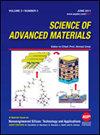Single-Cell Analysis Reveals Adipose Cancer-Associated Fibroblasts Linked to Trastuzumab Resistance in Human Epidermal Growth Factor Receptor 2-Positive Breast Cancer
IF 0.9
4区 材料科学
引用次数: 0
Abstract
Trastuzumab, a first-line targeted agent for HER-2-positive breast cancer, often faces challenges due to resistance. The IGF-1R/IRS-1/AKT pathway hyperactivation has been linked to this resistance, but the primary culprit, whether epithelial cells or cancer-associated fibroblasts (CAFs), remains uncertain. To investigate, we employed seRNA-seq to differentiate CAFs and epithelial cells in trastuzumab-sensitive and resistant breast cancer samples. iTALK analysis revealed potential interactions between CAFs and epithelial cells through IGF-1. We then analyzed 43 HER-2-positive breast cancer samples treated with trastuzumab, confirming higher expression of IGF-1R/IRS-1/AKT pathway proteins using immunohistochemistry. Notably, we identified five CAFs subtypes with varying proportions in both trastuzumab-sensitive and resistant samples. Further analysis revealed elevated IGF-1 levels in CAFs of trastuzumab-resistant tissues, particularly in adipose CAFs. Immunohistochemistry staining corroborated overexpression of COL11A1 (an adipose CAF marker) and increased IGF-1R and Tyr-phosphorylated IRS-1 in HER-2-positive breast cancer, associated with poor trastuzumab response. Our findings suggest that CAFs, particularly adipose CAFs, may induce trastuzumab resistance in HER2-positive breast cancer epithelial cells through IGF-1-mediated activation of the IGF-1R/IRS-1/AKT pathway.单细胞分析揭示人类表皮生长因子受体2阳性乳腺癌中脂肪癌相关成纤维细胞与曲妥珠单抗耐药相关
曲妥珠单抗是治疗her -2阳性乳腺癌的一线靶向药物,由于耐药经常面临挑战。IGF-1R/IRS-1/AKT通路的过度激活与这种耐药有关,但罪魁祸首是上皮细胞还是癌症相关成纤维细胞(CAFs)仍不确定。为了进行研究,我们使用seRNA-seq来区分曲妥珠单抗敏感和耐药乳腺癌样本中的caf和上皮细胞。iTALK分析揭示了caf和上皮细胞之间通过IGF-1的潜在相互作用。然后,我们分析了43例her -2阳性乳腺癌样本,使用曲妥珠单抗治疗,通过免疫组化证实IGF-1R/IRS-1/AKT通路蛋白的高表达。值得注意的是,我们在曲妥珠单抗敏感和耐药样本中确定了五种不同比例的CAFs亚型。进一步分析显示,曲妥珠单抗耐药组织的cas中IGF-1水平升高,尤其是脂肪cas。免疫组织化学染色证实her -2阳性乳腺癌中COL11A1(脂肪CAF标志物)过表达,IGF-1R和tyrr磷酸化的IRS-1升高,与曲妥珠单抗反应差相关。我们的研究结果表明,cas,特别是脂肪cas,可能通过igf -1介导的IGF-1R/IRS-1/AKT通路的激活,诱导her2阳性乳腺癌上皮细胞对曲妥珠单抗产生耐药性。
本文章由计算机程序翻译,如有差异,请以英文原文为准。
求助全文
约1分钟内获得全文
求助全文
来源期刊

Science of Advanced Materials
NANOSCIENCE & NANOTECHNOLOGY-MATERIALS SCIENCE, MULTIDISCIPLINARY
自引率
11.10%
发文量
98
审稿时长
4.4 months
 求助内容:
求助内容: 应助结果提醒方式:
应助结果提醒方式:


